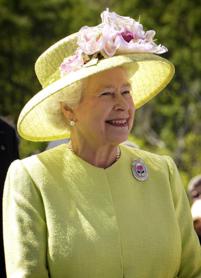We all know that Henry VIII made changes to the rules of succession, with his three Acts of Succession, but now today’s British Monarchy and Government may be considering changes.
The BBC has just reported that the Queen and Prime Minister, Gordon Brown, have discussed reforming the current rules concerning succession to the throne of the United Kingdom. Proposed changes include giving royal women equal rights in being heirs to the throne and abolishing the ban on heirs to the throne marrying Roman Catholics.
 Present Rules of Succession
Present Rules of Succession
At present, male heirs are given precedence over females even when the female is the eldest. For example, Princess Anne, the Queen’s second-born child, is way down the list of succession and stands at tenth behind her younger brothers, the Duke of York (Andrew) and the Earl of Wessex (Edward), and their children. Shouldn’t she come fourth?
No. The rules of male primogeniture mean that the children of male heirs, like the Duke of York and the Earl of Wessex, take precedence over Princess Anne even when they are female. What is more, even though Edward’s daughter, Louise, is older than her brother, James, she comes behind him in the line of succession.
Present line of succession to the UK’s throne (first 10):-
- HRH The Prince of Wales, Prince Charles (eldest son of Queen Elizabeth II) born 1948
- HRH Prince William (eldest son of Prince Charles) born 1982
- HRH Prince Harry (youngest son of Prince Charles) born 1984
- HRH The Duke of York, Prince Andrew (son of Queen Elizabeth II) born 1960
- HRH Princess Beatrice of York (daughter of the Duke of York) born 1988
- HRH Princess Eugenie of York (daughter of the Duke of York) born 1990
- HRH The Earl of Wessex, Prince Edward (son of Queen Elizabeth II) born 1964
- James, Viscount Severn (son of the Earl of Wessex) born 2007
- Lady Louise Windsor (daughter of the Earl of Wessex) born 2003
- HRH The Princess Royal, Princess Anne (daughter of Queen Elizabeth II) born 1950
Changes to this rule are being discussed because many feel that the rule of succession is blatant discrimination, especially when you think how successful past Queens of England have been. Times have changed since these rules were made.
The Catholic Question
Currently, the law requires that an heir to the throne must give up their right of succession if he or she marries a Roman Catholic or converts to Catholicism. Many in government believe that this is discrimination and needs to change. However, this is a real can of worms if you think about it carefully!
In a BBC interview this morning, historian David Starkey pointed out that the British monarch is the Supreme Governor of the Church of England, the protestant or Anglican Church – how can a Roman Catholic monarch be the “head” of the Church of England? If the monarch marries a Roman Catholic, then the children (heirs) could be brought up in the Catholic faith. It is a bit of a quandary, especially when you consider that there are no rules concerning marriage to non-Christians or people of other faiths!
When Will Reform Happen?
Although this debate is a hot news story, changes do not look imminent.
A Private Members’ Bill, put forward by Liberal Democrat MP Dr Evan Harris, which aims to end discrimination in the rules of succession, does not have government backing. However, Downing Street has confirmed that talks between the Prime Minister and the Queen have taken place and that discussions are ongoing. Gordon Brown is also set to raise the idea of such reforms in November at a Commonwealth summit. The other 15 countries that make up the Commonwealth would have to give their backing to the reforms because the British monarch is also their Head of State.
Many think that HRH the Prince of Wales, when he becomes King Charles III, will be “the agent of change”, It is already known that Prince Charles and his officials are thinking of changes that would be made to the monarchy when he becomes King. We may in the future see a United Kingdom where female heirs have the same right as male heirs and where monarchs can marry who they like.
Read more on the BBC News Website.
This keeps coming up, doesn’t it. I wish they would get on with it. It is an excellent idea!
SR
I agree!
I think it sounds like a good idea, In reality, who is really in charge of the Church of England? I thought the queen was more of a ceremonial head, the way the prime minister and Parliament are really in charge of the government. Personally, I would rather meet the prime minister than any member of the royal family. I was also wondering that if the queen does retire, how old poor Charles will be? Maybe his sons don’t want the job so the succession might change, but I’m just speculating.
This article is two years old … and nothing has changed yet, unfortunately.
I think now that Wiliam is getting married, there may be more of a push towards changing the law.
I do think William would feel that any children he had should be treated equally, so I agree in thinking that this issue may be reopened again soon.
However, whoever said the queen might retire – that ain’t gonna happen. She considers it to be a job for life. Charles ain’t getting on the throne until she dies, and yes he could be really old when that happens – consider how long the Queen Mother lived after all.
I actually don’t want it to change I’m really in favour of male heirs succeding.
Keep the law as it is!